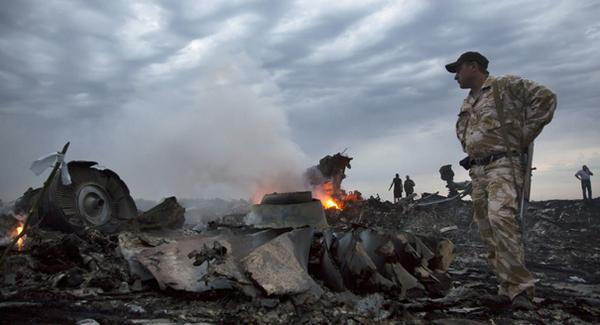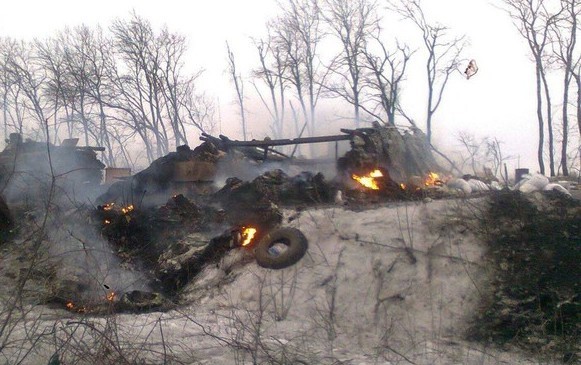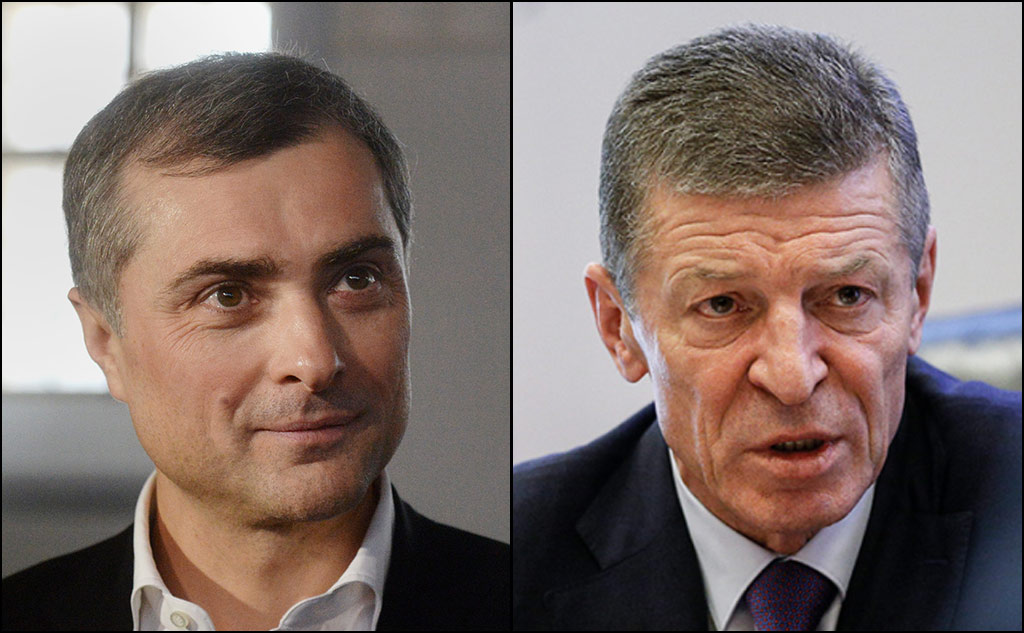By Mychailo Wynnyckyj
“Putin has monkeys in his head!” “No he doesn’t – they’re mushrooms!” This was the argument yesterday morning between two of my jetlagged daughters (7 and 9 years old). While in Canada during this last month, one of the more common questions I was asked by friends was: “How has the Ukrainian situation affected your kids?” I guess it has…
Another common question was “So how will things in Ukraine transpire next?” Without fail, my answer was “I have no access to Putin’s brain, so one guess is as good as any other.” Of course, flippancy rarely satisfied my Diaspora interlocutors. But my subsequent (more serious) answer was even less popular: Putin is playing a long-term game, and therefore what happens “next” (i.e. the tactical level) is less important than what can be done to counter him strategically. Putin’s goal is to destroy Ukraine, cutting its territory into two along the Dnipro river, and then taking a swath of land along the Black Sea coast for “Novorossiya”. Having accomplished that, his next goal is to undermine NATO through an incursion into the Baltic countries, and to thereby establish Russian political and economic hegemony (using oil and gas as weapons) over Europe. Unfortunately, neither economic sanctions against Russia, nor provision of direct military aid to Ukraine (both short term measures) will be sufficient to undermine these strategic goals.
Of course military assistance should not be discounted – particularly since it is recognized by the Ukrainian public as symbolic of the righteousness of this nation’s cause (seen here as not only defending Ukraine from aggression, but also as defending Europe from “Eurasian barbarism”). After returning to Kyiv 5 days ago, the sociologist in me craved to read the social mood. Although my method may be criticized for being insufficiently “scientific”, to get an idea of what people are talking about in Ukraine’s capital, I went to get a haircut. Within seconds of hearing that I had just returned from Canada, Sasha the barber jokingly asked me whether I was responsible for the huge amount of (non-lethal) military aid from Canada that had arrived recently. News of the RCAF C-130 Hercules transport landing in Kyiv has gone viral here: Canada is now recognized as the only NATO and G-7 member to fulfil on its promise to help the Ukrainian forces fighting Russia’s mercenaries in the Donbas. Hopefully more Ukrainian allies will follow suit shortly.
However, if Putin is to be opposed effectively, the West needs not only to help Ukraine’s military, but also to think of the country’s long term development. Strategically (once the immediate military threat to the Donbas has been repelled), that means helping to transform Ukraine into a showcase of European civilization; an outpost of security, economic prosperity, and rules-based government – similar to West Germany during the Cold War, and similar to Israel since the Yom Kippur war.
The West German and Israeli examples are instructive: Ukraine’s long-term future involves permanent existential threat, and if the West is to step up to its obligations to counter this threat (I dare say that after (Euro)Maidan, Ukrainians have earned a right to demand recognition of their membership in the European family of nations, and therefore a morally defendable case for assistance), EU and G-7 countries have an obligation to provide large-scale aid to Ukraine. Clearly the first priority must be military assistance: equipment, intelligence, training, and possibly air support if the conflict in the Donbas escalates further; a fortified wall must be built along the Ukrainian-Russian border (construction has already begun). The next step will be help with infrastructure reconstruction: roads, airports, telecom networks. Knowing a thing or two about the entrepreneurial spirit of Ukrainians, I have no doubt that with the right infrastructure in place, and having implemented the economic reform program of the current government (already in progress), this country will quickly develop into a new economic tiger.
However, long-term, if Ukraine is to become a showcase of European prosperity – indeed, if it is to become an example for the future transformation of a post-Putin Russia – Ukraine must establish two institutions that are crucial to western democracies, but have received little attention from agencies such as USAID, CIDA, and others in the past. Specifically, I am referring to education and health care. Ukraine’s educational and health care systems must become world class – just as those of West Germany and Israel became exemplary during the decades when these countries represented outposts of Western civilization in their respective regions. This cannot be done without direct assistance from western governments. Canada’s Bureau for International Education has a $15 million “Ukraine project” awaiting approval in Ottawa – this needs to be signed off on. The EU’s Erasmus Plus program (formerly Tempus) previously allocated a significant budget to Russia-based higher education reform projects – this money needs to be rechanneled to specifically Ukrainian projects when the call for proposals is announced in the autumn. Similar initiatives need to happen in health care.
As has become immensely clear to me during this past month in Canada, policy-makers and opinion-leaders throughout the world are looking for short-term solutions to what has come to be known as the “Ukraine crisis. The above are examples of short-term initiatives that will provide long-term results. They need to be adopted. At the same time, Diaspora leaders (who should have a longer time horizon than politicians eyeing their next election) need to keep their eye on the long-term: i.e. on strategy aimed at implementing the vision of Ukraine as a prosperous, democratic nation-state. This is the main idea behind the “Nova Krayina” movement, initiated within Ukraine by those who positioned themselves as “the brains of Maidan” during the December-February Revolution of Dignity, and have now developed a series of practical initiatives and policy recommendations. Diaspora organizations such as the UCC, UCCA, UWC should reach out to such domestic civil society initiatives, and help to match ideas/projects with financing from Ukraine’s international friends.
I fully recognize that the above thoughts (am I allowed to offer recommendations?) may be seen as “ivory tower” by some: the temptation to have current events overtake one’s thinking is ever-present, and (frankly, in my opinion) dangerous. For example, after the tragic downing of MH17 the phrase of the day in the western media became “game-changer”. Was this really such an earth-shattering event? Certainly it represented a turning point for politicians and policy-makers in western countries, but in reality, it meant little to the brave soldiers fighting for Ukraine’s independence in the Donbas. The same can be said for today’s article in The Guardian by Shaun Walker who finally confirmed the presence of Russian troops on the ground in Ukraine. Both this story, and the Malaysian Airlines disaster simply prove what Ukrainians have been saying for months: a) the conflict in the Donbas is not a regional war (and it is a war!), but rather a local instantiation of a growing global (or at least continental) conflict; b) Russia is not a rational actor that recognizes the norms of international law (Crimea proved that, but it took MH17 to bring the issue home to Europeans and Australians); c) because Putin’s authoritarian regime is not driven by rational motives, it is largely immune to such rationally grounded countermeasures as economic sanctions and/or international political isolation.
This last point needs some explanation. The global political economy is one that is based on an assumption of rationality (Max Weber coined the term “rational capitalism”). According to this paradigm, economic actors (producers and consumers) throughout the world make choices that, for the most part, are based on their own self-interest. This self-interest may be mediated by taste, cultural tradition, norms, fashion, etc. But at the end of the day, all of these are ‘higher level’ motives (ref. Maslow’s pyramid), and so will only be acted upon if the base needs are met regularly: i.e. if food, housing, and safety needs are threatened, their satisfaction will become a priority, and will trump all others. Logically therefore: if you want a public to pressure its leader, make that public starve! Similarly, if you want to affect the actions of a public figure, threaten that figure with isolation!
The paradigm of rational motives is easily extended into the political sphere in democratic countries (indeed this is why capitalism and democracy co-exist so well together). Accordingly, elected politicians respond to public opinion because it is rational to do so: re-election, continued elite status, and system stability all depend on it. If a politician’s decisions are not conducive to the betterment of the self-interest of the electorate, that leader will quickly lose popularity, and therefore (potentially) his/her position. And so, politicians act rationally.
But Putin is not a rational politician, and Russia is not a country where the dominant paradigm is rational choice (the Russian literary classic Fyodor Tutchev once famously proclaimed that “Russia is not to be understood with the mind alone” – Rossiyu umom ne poyniat’). Outside Moscow, St. Petersburg, and several other urban centers, Russia’s citizenry generally lives in abject poverty. Yet Russia’s voters continue to re-elect Putin, and indeed worship him as the “father of the nation”. This emotive component of Russian culture – which extends far beyond the political sphere into everyday life, and most importantly, interpersonal relations – is often very attractive both to travelers and scholarly investigators, but as recent events have shown, the geopolitical consequences of emotive foreign policy are (to put it mildly) dangerous. Putin is popular in Russia because he is restoring the empire – regardless of whether the result of such restoration will bring prosperity to Russians or not (more likely not). Long-term, this means the Russian population eventually will need to be “de-Putinized”. But first, the immediate and medium-term threats from this “backward country” (Lenin’s term!) need to be neutralized.
A few words about these immediate threats and the strange “dance” being performed by Putin in the run-up to his (inevitable, in my opinion) invasion of the Donbas:
Malaysian Airlines Flight 17 was shot down on July 17 by Putin’s terrorists in the Donbas using an ultra-modern SAM. No doubt this was a massive mistake. Last week, Ukraine’s Security Service (SBU) released a theory, according to which MH17 is said to have been a victim of target error – the real objective of Putin’s BUK missile was supposed to have been an Aeroflot flight en route from Moscow to Larnaca Cyprus, flying over the Donbas at approximately the same time and flight level as MH17. Apparently, the downing of the Russian passenger airliner (full of civilians) was to be blamed on Ukrainian forces, thus providing the Kremlin with a pretext for full scale invasion. Given Putin’s history of manufacturing emergencies with no regard for the lives of Russian citizens (e.g. the bombing of apartment buildings in Moscow and other Russian cities in 1999 – apparently by Chechens), the SBU theory deserves at least some consideration.
Yesterday and today, the Ukrainian (and world) media have been speculating as to what hides behind the supposed “humanitarian convoy” of 260 white-washed Russian Army trucks that left Moscow Tuesday morning supposedly en route to the Donbas. Short-term thinking (and media frenzy – particularly as to the convoy’s military helicopter escort) would have one panicking at this latest Kremlin initiative. Questions abound: is this a media ploy aimed at demonstrating Putin’s real concern for the “separatists” of Donbas who, according to Russian television, have been brutally assaulted by Ukrainian forces? Or is the convoy a “Trojan horse” – i.e. are its contents really exclusively humanitarian? In my opinion, both questions are not particularly relevant. A more important question is “how does Putin plan to provoke the Ukrainians into action that he can then demonstrate as being aggressive, and how do Ukrainians avoid the trap?”
But why would Putin need provoking? After his blatantly illegal annexation of Crimea, after demonstrating his complete disregard for international law and borders, after 4 months of waging a proxy war in the Donbas (that everyone except the most passionate Kremlin apologist recognizes as being commanded and fought by Russian military operatives), why would he need a pretext for invasion?
The answer lies in an apparent contradiction within Russian political culture: on the one hand, arbitrary decisions of the accepted national (authoritarian) leader are accepted as ‘prima facae’ righteous by his subjects, on the other hand, such decisions require ‘prima facae’ legalization. The same was true for Stalin: during the Great Terror, the dictator’s sole decision was sufficient to have any Soviet citizen executed, but each execution was fully documented with proof of guilt and/or (preferably) a confession. Indeed, the NKVD (Soviet secret police) expended massive efforts to extract confessions from individuals whose fate was previously determined by authoritarian fiat. “Surface legality” for action was required. The same pattern continues to be followed by Stalin’s student (and by his own admission - greatest admirer): Vladimir Putin. Pretexts for escalation were sought (and found) in Chechnya, Georgia, Transnistria…
In the short term, Ukraine must do everything possible to avoid providing the Russian President with the pretext that he needs for full-scale invasion. Indeed, avoiding such provocation seems to have been Kyiv’s main policy goal in Crimea. It worked then: Putin’s plan for a break-up of Ukraine and the occupation of all of the east and south of the country by Russia, failed. Throughout the past 3 months of violent conflict in the Donbas, Ukrainian forces have been under strict orders not to return fire when bombarded by artillery from the Russian side of the border. The downing of an Aeroflot airliner would have provided Putin with an ideal pretext for invasion, but the missile seems to have missed. The current yarn with Russia’s “humanitarian convoy” seems to be the latest in a long history of provocative actions taken by the Kremlin aimed at supplying the “surface legality” for escalation.
Putin seems to be getting desperate to find his “Serbian assassin”, and he’s apt to supply any “Crown Prince Ferdinand” so as to spark all-out war. The next time anyone feels like criticizing the Ukrainian government for its apparently insufficiently stern reaction to Russian aggression, they should think about the consequences of falling for Putin’s provocations. From far away, it’s always better to work towards the long-term strategic objectives, and to leave the short-term battles to the brave men fighting and dying to protect Europe’s (as yet largely unrecognized) eastern front.
God help us!
[hr]Source: fb. Mychailo Wynnyckyj PhD, Kyiv-Mohyla Academy





